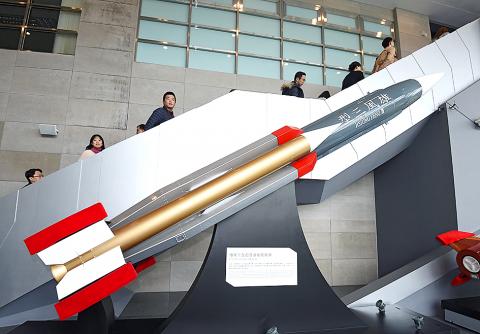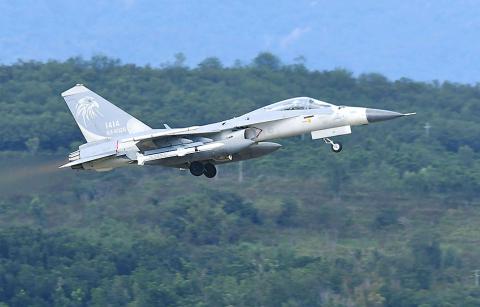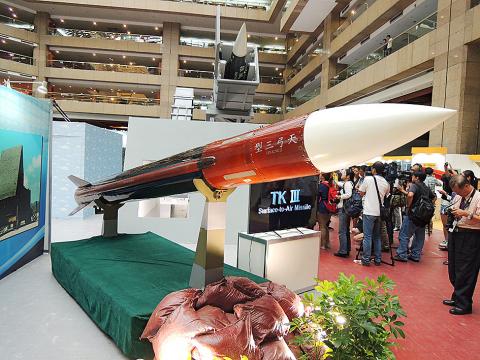Taipei and Washington have signed an agreement to share information on scientific research that would allow representatives of Taiwan’s research institutions, including the Chungshan Institute of Science and Technology and the Ministry of National Defense’s Armaments Bureau, to visit national defense research institutions and laboratories in the US next year, an unnamed senior military official said yesterday.
Such US facilities have never been open to Taiwanese researchers, the official said, adding that the deal would greatly benefit Taiwan’s self-defense capabilities, including the domestic production of military vessels and aircraft.
Cooperation with the US is expected to shorten the institute’s development and production time and could provide a breakthrough, as well as reduce the time needed for ongoing enhancement programs for the Tien Kung (“Sky Bow”) surface-to-air missile, the Tien Chien (“Sky Sword”) air-to-air missile and the Hsiung Feng (“Brave Wind”) anti-ship missile systems, the source said.

Photo: Liu Hsin-de, Taipei Times
It could also help the institute cut costs, the official said, adding that the benefits are difficult to measure.
The official did not specify which facilities Taiwanese representatives would be allowed to visit, saying that would depend on US officials.
Taiwan’s resources are limited, as the annual defense budget is only about US$10 billion, the official said, adding that as it is difficult to compete with China in terms of quantity, Taiwan needs to focus its resources on key projects.

Photo: Yu Tai-lang, Taipei Times
Although Taiwan is confident about its technological capabilities, the US is the world leader in the arms industry, said Democratic Progressive Party Legislator Wang Ting-yu (王定宇), coconvener of the Legislative Yuan’s Foreign Affairs and National Defense Committee.
If Taiwanese and US researchers can visit each other, it would help Taiwan achieve breakthroughs in military technology, he said.
More importantly, exchanges between researchers are on a higher level than joint military exercises, Wang said, adding that they would symbolize close relations with the US.

Photo: Lo Tien-pin, Taipei Times
The passage of US legislation that is advantageous to Taiwan, including parts of the latest National Defense Authorization Act and the Taiwan Travel Act, have created opportunities to facilitate equal and mutually beneficial exchanges between Taiwan and the US, said Chinese Nationalist Party (KMT) Legislator Lu Yu-ling (呂玉玲), the committee’s other coconvener.
However, as Taiwan is in desperate need of actual assistance from the US, mutual exchanges between military research institutions would provide a significant boost to Taiwan’s self-defense capabilities and the development of the domestic defense industry, she said.
As relations warm between North and South Korea, and North Korea and the US, Taiwan cannot become a bargaining chip in international relations, Lu said.
Aside from improving Taiwan-US relations, if Taiwan engages in further exchanges with the US military and research institutions, it could also improve the nation’s self-defense capabilities, in turn elevating its importance and position on the international stage, she said.

INVESTIGATION: The case is the latest instance of a DPP figure being implicated in an espionage network accused of allegedly leaking information to Chinese intelligence Democratic Progressive Party (DPP) member Ho Jen-chieh (何仁傑) was detained and held incommunicado yesterday on suspicion of spying for China during his tenure as assistant to then-minister of foreign affairs Joseph Wu (吳釗燮). The Taipei District Prosecutors’ Office said Ho was implicated during its investigation into alleged spying activities by former Presidential Office consultant Wu Shang-yu (吳尚雨). Prosecutors said there is reason to believe Ho breached the National Security Act (國家安全法) by leaking classified Ministry of Foreign Affairs information to Chinese intelligence. Following interrogation, prosecutors petitioned the Taipei District Court to detain Ho, citing concerns over potential collusion or tampering of evidence. The

‘FORM OF PROTEST’: The German Institute Taipei said it was ‘shocked’ to see Nazi symbolism used in connection with political aims as it condemned the incident Sung Chien-liang (宋建樑), who led efforts to recall Democratic Progressive Party (DPP) Legislator Lee Kun-cheng (李坤城), was released on bail of NT$80,000 yesterday amid an outcry over a Nazi armband he wore to questioning the night before. Sung arrived at the New Taipei City District Prosecutors’ Office for questioning in a recall petition forgery case on Tuesday night wearing a red armband bearing a swastika, carrying a copy of Adolf Hitler’s Mein Kampf and giving a Nazi salute. Sung left the building at 1:15am without the armband and apparently covering the book with a coat. This is a serious international scandal and Chinese

Seventy percent of middle and elementary schools now conduct English classes entirely in English, the Ministry of Education said, as it encourages schools nationwide to adopt this practice Minister of Education (MOE) Cheng Ying-yao (鄭英耀) is scheduled to present a report on the government’s bilingual education policy to the Legislative Yuan’s Education and Culture Committee today. The report would outline strategies aimed at expanding access to education, reducing regional disparities and improving talent cultivation. Implementation of bilingual education policies has varied across local governments, occasionally drawing public criticism. For example, some schools have required teachers of non-English subjects to pass English proficiency

TRADE: The premier pledged safeguards on ‘Made in Taiwan’ labeling, anti-dumping measures and stricter export controls to strengthen its position in trade talks Products labeled “made in Taiwan” must be genuinely made in Taiwan, Premier Cho Jung-tai (卓榮泰) said yesterday, vowing to enforce strict safeguards against “origin laundering” and initiate anti-dumping investigations to prevent China dumping its products in Taiwan. Cho made the remarks in a discussion session with representatives from industries in Kaohsiung. In response to the US government’s recent announcement of “reciprocal” tariffs on its trading partners, President William Lai (賴清德) and Cho last week began a series of consultations with industry leaders nationwide to gather feedback and address concerns. Taiwanese and US officials held a videoconference on Friday evening to discuss the